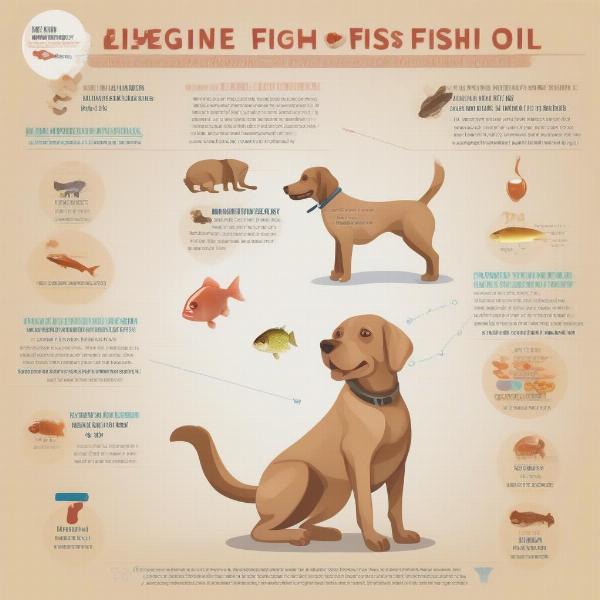Fish oil is a popular supplement for dogs, known for its potential health benefits, particularly for skin, coat, and joint health. But with so many options available, understanding how to choose the right fish oil and administer it safely is crucial. This guide provides everything you need to know about using fish oil for your canine companion.
What are the Benefits of Fish Oil for Dogs?
Fish oil is rich in omega-3 fatty acids, specifically EPA (eicosapentaenoic acid) and DHA (docosahexaenoic acid). These essential fatty acids play a vital role in various bodily functions and offer a range of potential benefits for dogs:
- Skin and Coat Health: Omega-3s can help reduce itching, dryness, and inflammation, leading to a healthier, shinier coat and reducing shedding. They can also be beneficial for dogs with allergies or skin conditions.
- Joint Support: Fish oil’s anti-inflammatory properties can help alleviate joint pain and stiffness, particularly in dogs with arthritis or hip dysplasia. It can improve mobility and overall joint function.
- Heart Health: Omega-3s can contribute to heart health by reducing triglyceride levels, lowering blood pressure, and improving overall cardiovascular function.
- Brain Development and Cognitive Function: DHA is crucial for brain development in puppies and can support cognitive function in older dogs. It may help improve memory, learning, and overall mental sharpness.
- Immune System Support: Omega-3s can help boost the immune system, making dogs more resilient to infections and illnesses.
- Eye Health: DHA is essential for maintaining healthy eyes and can help prevent age-related vision problems.
- Kidney Support: Studies suggest omega-3s can support kidney function in dogs with chronic kidney disease.
 Fish Oil Benefits for Dogs
Fish Oil Benefits for Dogs
How to Choose the Right Fish Oil for Your Dog
Selecting the right fish oil supplement can be overwhelming. Look for these key factors:
- Source: Choose fish oil derived from smaller, cold-water fish like salmon, anchovies, or sardines, as they are less likely to contain high levels of mercury and other contaminants.
- Purity: Ensure the product has been purified to remove toxins and heavy metals. Look for third-party testing certifications.
- EPA and DHA Content: Check the label for the specific amounts of EPA and DHA. Higher concentrations are generally more effective.
- Form: Fish oil comes in various forms, including capsules, liquids, and chews. Choose the form that is easiest to administer to your dog.
- Storage: Opt for fish oil stored in dark bottles to protect it from oxidation and maintain its potency.
What is the Correct Dosage of Fish Oil for Dogs?
The appropriate dosage of fish oil depends on your dog’s size, age, and health condition. Always consult with your veterinarian before starting any new supplement, especially if your dog has underlying health issues or is taking other medications. They can help determine the right dosage for your individual dog.
Are There Any Side Effects of Fish Oil for Dogs?
While generally safe, fish oil can cause some side effects in dogs, including:
- Gastrointestinal upset: Diarrhea, vomiting, or fishy breath.
- Increased bleeding risk: In high doses, fish oil can thin the blood, which may be a concern for dogs with bleeding disorders or undergoing surgery.
- Allergic reactions: Some dogs may be allergic to fish oil, exhibiting symptoms like itching, hives, or facial swelling.
What to Look For in a High-Quality Fish Oil Supplement
Choosing a high-quality fish oil supplement is crucial for maximizing benefits and minimizing risks. Consider the following:
- Third-party testing: Look for products tested by independent labs to ensure purity and potency.
- Sustainable sourcing: Choose fish oil from sustainable fisheries to protect marine ecosystems.
- Clear labeling: The label should clearly state the source of the fish oil, the amounts of EPA and DHA, and any other ingredients.
Conclusion
Fish oil can be a valuable addition to your dog’s diet, offering numerous potential health benefits. By understanding the benefits, risks, and how to choose a high-quality product, you can make an informed decision about whether fish oil is right for your furry friend. Remember to always consult your veterinarian before starting any new supplement to ensure its safety and efficacy for your dog’s individual needs.
FAQ
- Can I give my dog human fish oil? It’s generally recommended to use fish oil supplements specifically formulated for dogs. Human fish oil may contain ingredients that are not safe for dogs.
- How long does it take to see results from fish oil? It may take several weeks or even months to see noticeable improvements in your dog’s health after starting fish oil supplementation.
- What should I do if my dog experiences side effects from fish oil? Discontinue use and consult your veterinarian.
- Can I give my puppy fish oil? Yes, fish oil can be beneficial for puppies, but consult your veterinarian for the correct dosage.
- Is fish oil a substitute for prescribed medications for arthritis? No, fish oil should not be used as a replacement for prescribed medications. It can be used as a complementary therapy, but always discuss it with your veterinarian.
- Can I give my dog too much fish oil? Yes, excessive amounts of fish oil can cause adverse effects. Follow the recommended dosage and consult with your veterinarian.
- Where can I buy high-quality fish oil for dogs? High-quality fish oil supplements can be purchased from reputable pet stores, online retailers, and veterinary clinics.
Related Articles
ILM Dog is your trusted resource for expert dog care advice. We offer a wealth of information on dog breeds, health, training, nutrition, grooming, and much more. Whether you’re a new dog owner or a seasoned expert, we are here to support you every step of the way. From choosing the right breed to providing the best possible care, ILM Dog has you covered. Contact us at [email protected] or +44 20-3965-8624 for personalized guidance and support. Visit ILM Dog for all your dog care needs.